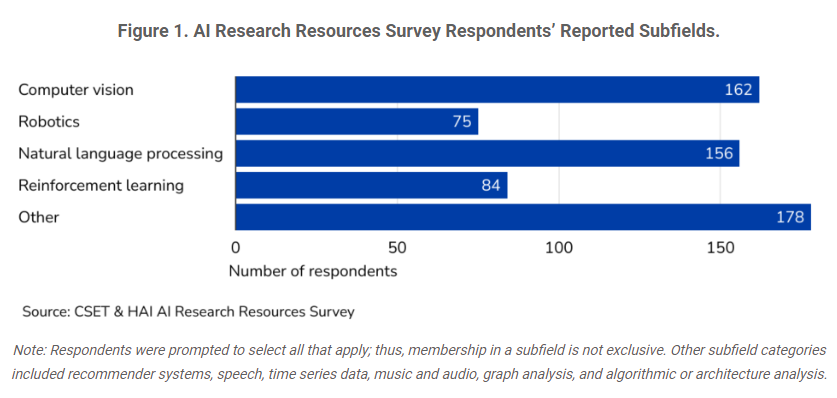In our previous post, we covered findings from CSET surveys and explored how their results reinforce our research findings and policy recommendations. Now we look to the future and preview some upcoming CSET survey projects.
One survey effort in the works is in collaboration with the Stanford Institute for Human-Centered Artificial Intelligence (HAI). Earlier this year, we conducted a survey on the availability, use, and importance of compute resources, or computational power, for artificial intelligence research. We investigated how compute-resource accessibility affects AI researchers’ ability to achieve progress in their field, how greater access would change their work choices, and what resources researchers believe are necessary to advance the AI field. We surveyed workers and students in U.S. private industry, academia, the nonprofit sector, and government who publish AI research. Our report dives into the role and accessibility of compute for AI researchers in various AI subfields, positions, and organizations.
Figure 1. AI Research Resources Survey Respondents’ Reported Subfields.

For more information, read about the compute demands of cutting-edge AI models in AI and Compute, as well as the factors driving AI progress in The AI Triad and What It Means for National Security Strategy, and be on the lookout for our report later this year!
Another survey effort in partnership with BNH.AI, a boutique law firm focused on AI, will engage private sector companies to learn about their perspectives on AI regulation and ethics. The survey will target counsel and other professionals responsible for ethical and legally compliant AI to ask about their thoughts and opinions of the regulatory structure, guidance, risk, and uncertainties in their work. This research is part of a growing AI assessment research agenda at CSET focused on AI/ML standards, testing, safety, accidents, and governance, which includes voluntary guidelines and regulations. For more information, read Key Concepts in AI Safety: An Overview and Ethics and Artificial Intelligence, and be on the lookout for our report!
Additionally, an upcoming survey from our bio-risk line of research aims to gain insights on how members of the scientific community define and perceive types of biotechnology research. The bio-risk team’s work will analyze trends to help government and society harness biotechnology’s potential to promote health and new industries, as well as understand the potential for its misuse. It includes examination of the biotechnology workforce, infrastructure, and funding that supports biotechnology research. For more information, read our report on Mapping Biosafety Level-3 Laboratories, and be on the lookout for more from our team soon!
We look forward to sharing our results on these efforts in the future. For more information or to talk to a member of our team about these research efforts, please contact us at CSET@georgetown.edu.
